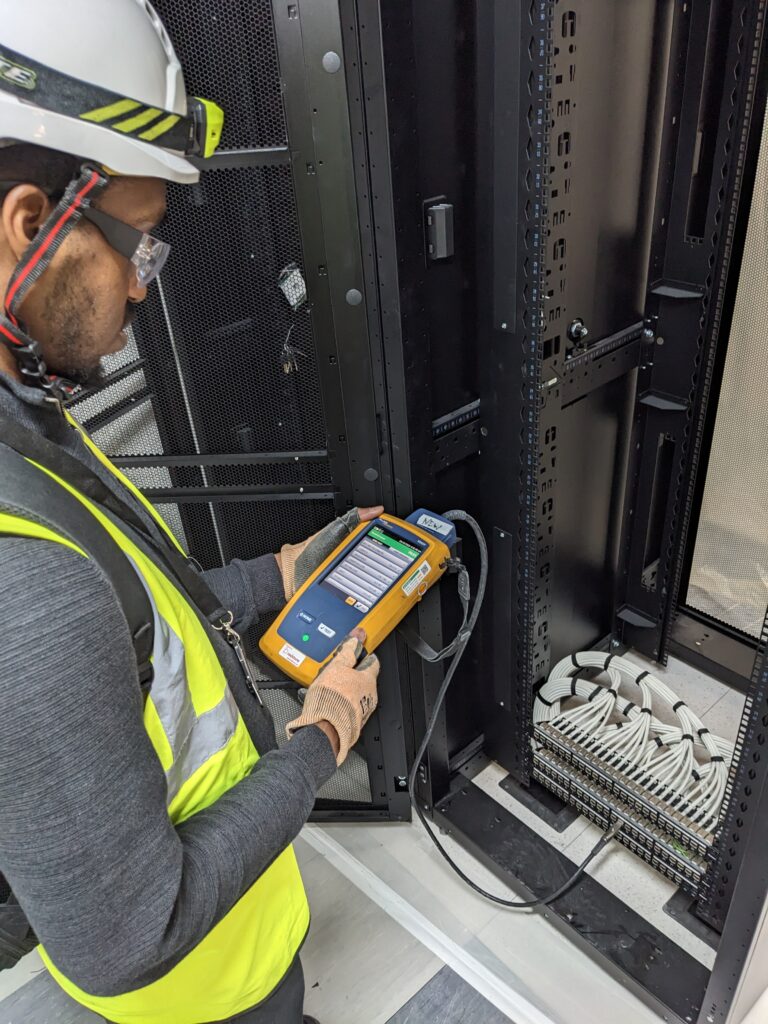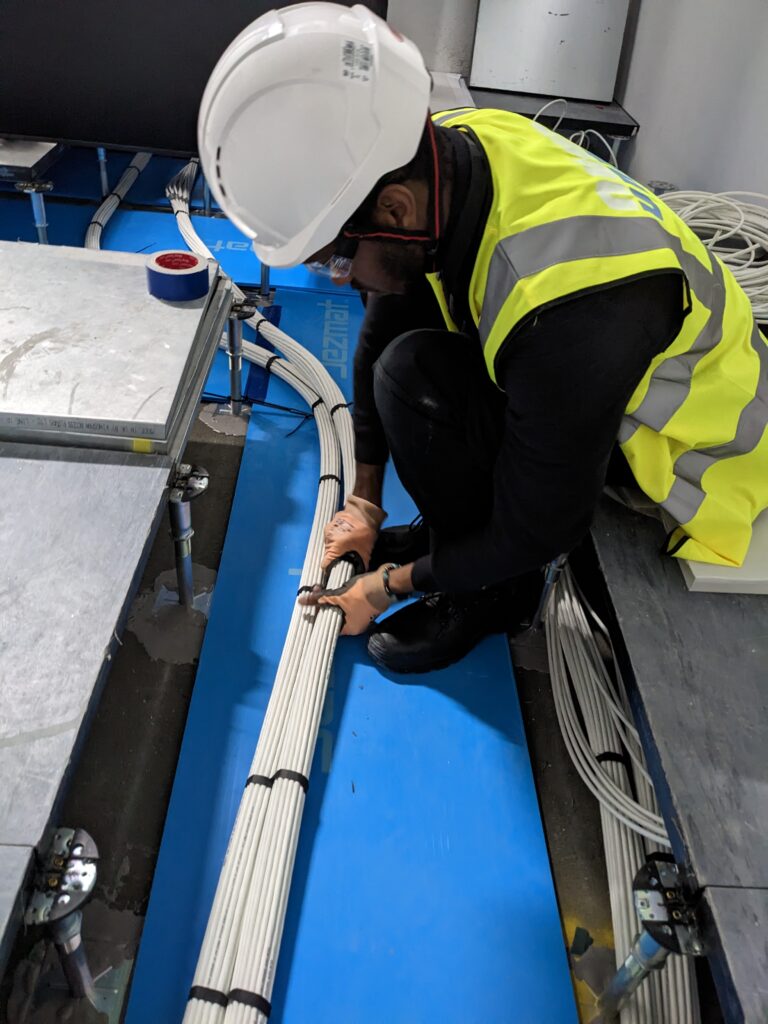
Investors in People: the next generation in Digital Infrastructure
In the latest issue of Inside_Networks Magazine, Onnec’s Dave Buchanan dives into apprenticeships in the digital infrastructure sector, Onnec’s Network Cable Installer (NCI) Apprenticeship Programme with CNet Training, and why it is so important to encourage the next generation to join the industry.
Why do you take on apprentices?
Onnec recognises the need to bring young blood into the game. I’ve been with Onnec for 27 years and during that time many people have naturally progressed within the company from engineering to the management roles that they’re in today. However, engineering roles have been difficult to backfill due to the industry shortage.
We see this as a great opportunity to bring new talent into the business, diversify our workforce and get the apprentices up to scratch. This is not only from a cabling perspective, but as part of our succession planning across the business. These individuals may be able to move into another role, which they would never have had the opportunity to do if they hadn’t completed their apprenticeship with us.
Is becoming an apprentice the best way for someone to get the requisite skills to succeed in the network infrastructure sector?
I definitely think it’s one of the best ways, particularly the way we have structured the program here at Onnec. Our apprentices gain insights into the wider picture surrounding structured cabling, with exposure to our full range of network infrastructure solutions – from design and networking to new smart building solutions – all from one company.
Onnec’s apprenticeship program was six months in the making. Across all of our internal departments, from human resources to marketing, accounts and managed service solutions, we discussed what we needed to cover throughout the 16 month program.
As a result we constructed a really comprehensive plan, built around the core CNet Training Network Cable Installer (NCI) Apprenticeship program. It’s a unique, tailored program that has been carefully planned to ensure apprentices get everything they need to learn out of the apprenticeship, with input from Onnec, CNet Training, our cabling vendors and many more besides. At completion, the apprentices will have the opportunity to work as a lead engineer on a small level project. The whole program is structured to ensure maximum learning and experience in every aspect of the role and with the full support of everyone at Onnec.
How much does it cost to take on an apprentice throughout their training?
In financial terms, there’s government funding available – a percentage of which comes from businesses through the levy. Onnec’s program runs beyond the length of the NCI Apprenticeship because we want our apprentices to be able to move onwards and upwards beyond that period and be able to manage small sites.
Cost doesn’t really come into at the end of the day, as long as the education is provided to the level that you’re expecting – and this is certainly a demanding program. We ensure our apprentices have time to do the paperwork that’s needed, which includes weekly progress reports, pictures, statements, challenges, etc. The way I see it, if I invest in that time, I’m going to get a better investment back from them. If you don’t give them time to learn, then they’ll lose morale and things will start to slip. I’ve already seen the results that these guys are getting, which is the reward for giving them the time to put all their efforts into it.
What are the challenges/difficulties of taking on an apprentice?
The biggest challenge is trying to get the apprentices to the same level because, at any age, some people are quicker at learning than others. This is why we structured it in such a way that they get to shadow the various departments, whether it be on-site or in the office. Every week we review what we’ve got to cover off and the apprentices will complete progress reports on what they’ve been doing. Therefore, if there are things that pop up that someone hasn’t covered, I get the opportunity to identify that really quickly and level the platform.
What do you think are the key qualities of a successful apprentice?
We purposefully did not look to recruit anyone with experience. We were looking for people with the desire to learn something completely different from what they’d done previously, and who we could mould into what we need as a company.
Our apprentices are from diverse backgrounds – from printing and security to bar work. We had significant interest in our apprenticeship, with well over 160 applicants. Using selection questions and criteria, we settled on 20 people to invite to interview. We asked the usual questions like why they wanted the job, but we also presented them with five practical tasks to complete. It wasn’t about who could do it the quickest, it was about us being able to see those key qualities, such as how they reacted to a task under pressure and how they communicated, as well as the results.
“What’s the point of taking on an apprentice as they’ll only leave when they’ve finished and I’m left with nothing.” How would you respond to this comment?
Generally, people leave because of money. They believe that the grass is greener and they may get a little bit more elsewhere. Onnec is a large global organisation and we’ve got great opportunities for these apprentices, should they wish to go for them. When going through the interview process, we were purposefully looking for candidates that would want, and saw potential for, a long-term career with Onnec.
At the moment, the focus is on learning, and everyone here is invested in helping them to succeed. We have a friendly environment, where they can call upon anyone at any time and ask for some guidance or direction. Be it me, their site manager or a colleague, we’ve all learnt, we’ve all come up. The majority of people that are at senior level today have progressed through the ranks, so they know what it’s like to be a cabling engineer.
We’re giving the apprentices the support they need from people they can aspire to be. We can’t guarantee they’re going to be out of cabling within two years, for example, but one thing I can say for sure is if they commit 100 per cent, we will commit 100 per cent, and when those opportunities arise, they can grab them.
In what ways does taking on apprentices benefit your company?
We’re looking at a long-term strategy at Onnec. As a rapidly growing organisation, finding and retaining the highest calibre of people is fundamental for the success of our business. Introducing apprentices to the team brings a broader diversity of background and experiences, providing our teams with a fresh perspective. Recruiting apprentices gives us a chance to diversify our workforce, plan for the future and capitalise on the expertise offered by CNet Training.
These apprentices may not necessarily stay in the cabling side of the business and that’s why we chose the shadowing process – so they can gain real experience across all departments. They have opportunity to undertake as much as training as possible in cabling via CNet Training’s programs, as well as our own internal training, being out on-site with various supervisory teams and, of course, working with experienced staff who are sharing their expertise and showing them how to do things correctly.
Overall, we’re just happy that we’ve got these apprentices because it opens the gates for them to be able to diversify, should they want to do so at a later date, and should we have the position for them to do so.
What more could be done to encourage more network infrastructure firms to take on apprentices?
I think it’s about showing what the future could be for them. If you want people to be interested, you must look at what you want from them and the way you’re going to train them.
I’m a big believer that you must invest in people and if you’re not prepared to give them the time, you won’t get the rewards later. As to whether those individuals will stay in the cabling industry, and how you can retain them, it’s down to what you give them long-term and the company’s overall commitment to seeing apprentices succeed. This goes way beyond just running a piece of cable.
From an article in Inside Networks published on 05 December 2023. Read the January Issue of Inside Networks here.


About Inside_Networks
Inside_Networks is the leading online magazine dedicated to enterprise and data centre IT network infrastructure.

About CNet Training
International award-winning education company, CNet Training has been designing and delivering professional network infrastructure training programs since 1996. Today, officially the largest education provider in the world dedicated to the digital infrastructure industry, comprising the data centre and network infrastructure sectors, CNet Training is recognised throughout the world for being the global industry leader and the only industry dedicated education provider to award both internationally recognised Pearson qualifications and professional certifications, starting at entry level through to a qualification level 7 Masters Degree program.
Onnec are a CNet Committed Education Partner, recognising our commitment to education and skills development by enrolling employees onto the Network Cable Installer (NCI) Apprenticeship.
